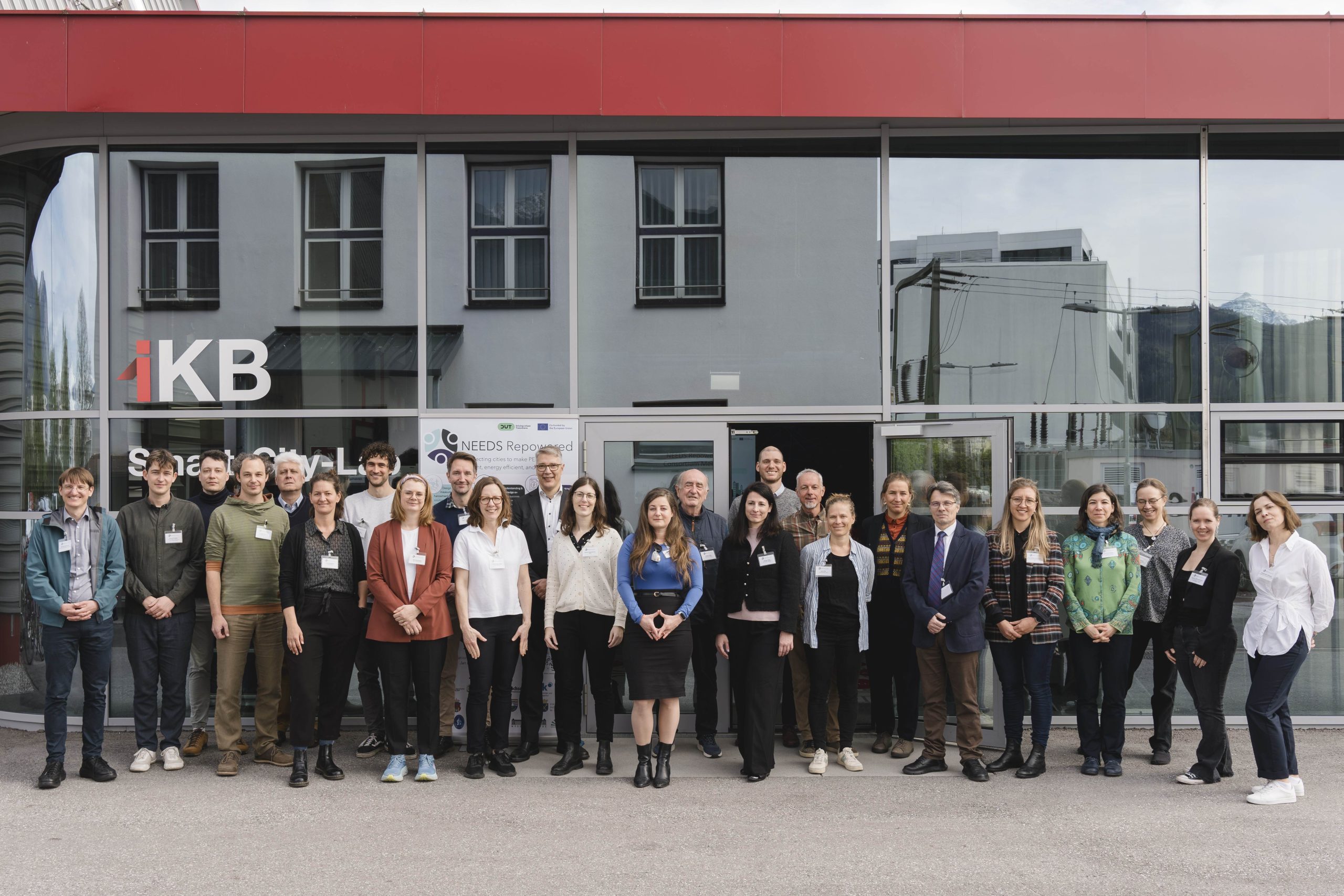The launch of a Collaborative Journey Toward Resilient Energy Districts
🏙️ NEEDS Repowered brings together cities across Europe in the face of ongoing energy crises. Funded under the Driving Urban Transitions Partnership, co-financed by the European Commission, the project connects six European cities—Innsbruck (AT), Karlsruhe (DE), Kraków (PL), Iași (RO), Budaörs (HU), and Helsingborg (SE) — to enhance the resilience of Positive Energy Districts (PEDs) amidst current energy challenges.
The recently launched NEEDS Repowered project focuses on so-called Positive Energy Districts (PEDs). Positive Energy Districts (PEDs) are urban areas that locally produce more renewable energy than they consume. By combining sustainable energy production, innovative technology, and active community involvement, PEDs help cities become more climate-friendly and resilient. Under the leadership of the AIT Austrian Institute of Technology, 15 European partners are collaborating to implement the three-year project.
Tackling Energy Poverty Through Collaborative Urban Climate Solutions
Designing and implementing effective climate policies focused on energy efficiency and urban retrofitting is a complex and time-consuming process. It requires intense cooperation among public authorities, developers, building owners, tenants, investors, and other key stakeholders. With pressing challenges such as the rise of energy poverty in Europe, NEEDS Repowered addresses critical questions: Can energy-efficient neighbourhoods reduce pressure on urban grids? How can inclusive policy design and innovative consultation formats ease the burden of heating costs on vulnerable populations?
“By showcasing technological solutions for retrofitting PEDs, designing effective behavioural incentives, and co-creating sustainable business and financing models, the project operates at the intersection of social and technological innovation, while addressing regulatory and legal frameworks in a holistic way.” Says project leader and Senior Scientist at AIT Austrian Institute of Technology Gudrun Haindlmaier.
Building a Community of Practice for Inclusive and Resilient PEDs
To deepen understanding and strengthen knowledge exchange around PEDs, NEEDS Repowered establishes a Community of Practice (CoP) between the cities. This network will support the exchange of knowledge, identifying both barriers and enablers for energy efficiency in PEDs. Local knowledge arenas will be nurtured and transformed into incubators of community capacity and innovation.
The project will also deliver valuable insights into how to address energy crises, poverty, and justice from a systemic perspective. Furthermore, it will explore how to replicate and upscale successful approaches across diverse social, economic, and geographical contexts. By addressing the essential building blocks of PEDs, the project will show how one district can support another—overcoming silo-thinking, sub-optimization, and segregation.
A Holistic and Inclusive Approach
NEEDS Repowered embraces a holistic and inclusive approach to tackling energy vulnerability, enhancing the resilience of PEDs through innovative retrofitting strategies and behavioural change incentives. Each Repowered Site explores context-specific solutions to help cities withstand energy crises by unlocking local potential, boosting efficiency, and reducing consumption. Supported by experts from multiple fields, each site will develop joint methodologies for community engagement, co-creation of solutions, and impact monitoring—paving the way for sustainable, efficient, and people-centered energy systems.
The Repowered Sites – local action with shared purpose
NEEDS Repowered brings together six cities across Europe, each facing unique challenges and contributing diverse solutions to the development of resilient, inclusive PEDs:
- Innsbruck, AT: Developing efficient, decarbonized heating solutions, exploring photovoltaic integration, and fostering collaboration between landlords, tenants, and energy providers.
- Karlsruhe, DE: Fostering knowledge transfer and lowering participation barriers to support solar energy initiatives and promote balcony PV projects.
- Kraków, PL: Designing and implementing an e-community platform that links solar energy prosumers with electric vehicle users to create a decentralized charging network.
- Iași, RO: Leveraging smart grids, behavioural change incentives, and recyclable materials to improve energy performance in a university-based urban pilot.
- Helsingborg, SE: Focusing on shared energy solutions, while aligning business models, policy planning, and community needs.
- Budaörs, HU: Supporting the creation of a transparent energy-sharing system, mobilising energy communities, and developing scalable business models for PEDs.






Comments are closed